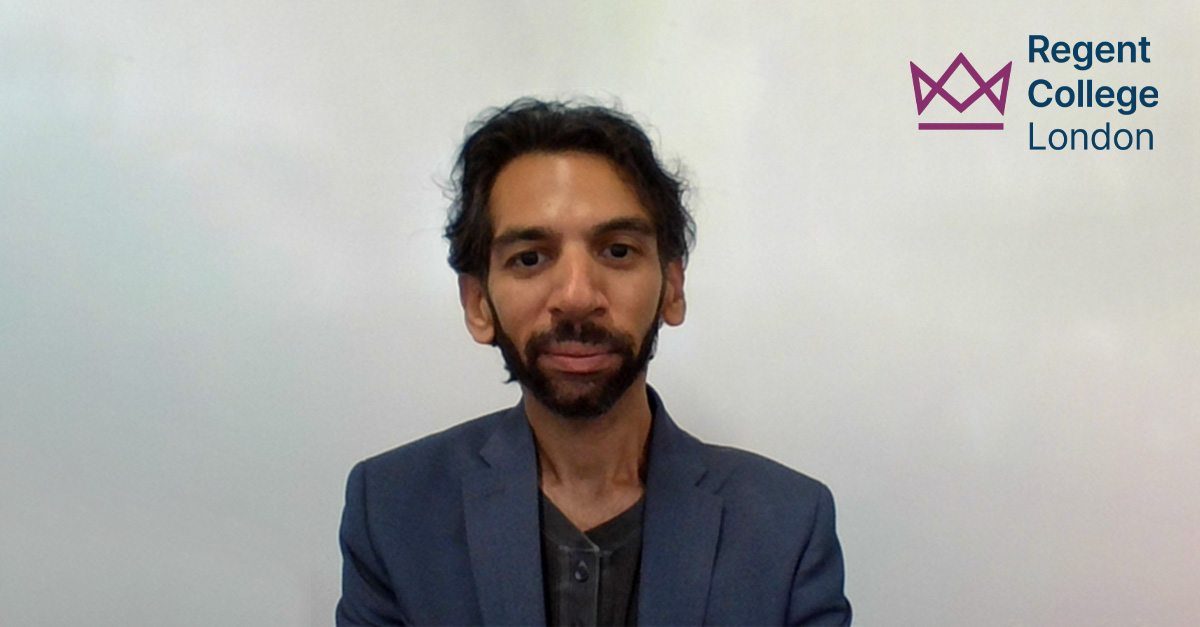
As part of RCL’s 25th anniversary celebrations, we are shining a spotlight on Business and Law lecturer Assad Shamsi, who has been with us for almost our entire history.
From attending GCSE tuition sessions during the College’s early days in 2001 to joining our academic team in 2007, Assad’s story is truly inspiring.
Now, as he prepares to apply the finishing touches to his upcoming book – The Octagon of Scaling Mantras, co-authored with RCL Senior Lecturer Dr Palto Datta – we sat down with Assad to discuss his accomplishments and hear about his ambitions for the future.
“A burst of positivity”
Assad’s remarkable journey began when he was 16 years old, and he is quick to credit his mother for kickstarting it.
She knew her son would require additional support with his GCSEs. One Saturday afternoon during the October half term break, she brought him to the University of Westminster, where our CEOs Selva and Tharshiny Pankaj were delivering GSCE and A-level tuition sessions.
“I will never forget meeting Selva and Tharshiny for the first time,” recalls Assad. “They greeted my mother and I with a burst of positivity. It was refreshing to meet teachers who were so enthusiastic about their work.”
As Assad embarked on this new adventure, he soon came to appreciate the small class sizes that Selva and Tharshiny operated and noted how these enabled tutors to provide the optimal amount of attention and support to each student.
“From the very beginning, I have seen Selva and Tharshiny’s commitment to excellence,” adds Assad. “They have always held high expectations for themselves.”
“A new perspective”
RCL experienced rapid growth throughout the 2000s. As both a student and part-time administrative assistant at the College, Assad had a front row seat to see these changes unfold.
“I started my sessions in October 2001,” he says. “By July 2002, I was collecting my GCSE results from their new campus. It seemed that every two years or so, RCL would open a new, even bigger location.”
For some time, Assad visited the College seven days a week.
From Monday to Friday, he attended his classes. On Saturdays and Sundays, he worked “behind the scenes” in an administrative role in the office, alongside Selva Pankaj and Senior, Selva’s father.
“That was a great opportunity that helped me develop from a young age,” says Assad. “There was a sense of camaraderie, and I got to experience the College from a new perspective.”
In the back of Assad’s mind was a growing desire to become a lecturer. This ambition was inspired by his late brother, who strived to become a tutor before his passing.
One afternoon, as they were locking up the office after work, Senior told Assad that he should consider pursuing a career as a tutor. He specifically recalls Senior telling him, “You can start slow”.
Inspired by this advice, Assad did indeed pursue a career in academia. In 2005, he enrolled in a BSc Business Computing course at the University of Westminster. He graduated in 2008.
In 2007, Assad started tutoring part-time GCSE and A-level students in information technology (IT). For a number of years, he continued to work part-time in other industries – initially starting in accounting before moving into IT and customer relationship management (CRM).
Assad considers himself lucky to have worked across different sectors as it has enabled him to “understand the entire business ecosystem” and apply these learnings to his work in the classroom. He also took inspiration from all the teachers who had inspired him throughout his life.
“When I started teaching, I also wanted to emulate the teachers who enriched my learning journey,” says Assad. “What they all had in common was possessing that advanced technical knowledge, while also understanding the importance of building a rapport with the student. You need to bring them out of their shell before the learning can properly begin.”
“Teaching is who I am”
When asked about his work as a lecturer, Assad’s eyes light up.
“First of all, we have very good students at RCL,” says Assad. “Without them, I simply would not be able to enjoy my work so much.”
He goes on to explain that teaching is not just what he does, it is who he is as a person. Assad appreciates the level of responsibility he has in the classroom and takes great satisfaction in supporting students to excel in their academic journey, providing the kind of individualised attention that he enjoyed when attending RCL all those years ago.
By all accounts, lecturing is a demanding job, but Assad admits that he never gets stressed due to his extensive lesson planning, which he often does weeks in advance.
“I always write a list of key outcomes that I can follow for every lesson,” says Assad. “I don’t want to be in the classroom wondering what I am going to do next. I just want to be there on time, prepared, and just perform.”
Early in his lecturing career, Assad was mostly teaching information technology. While he enjoyed it, he knew that teaching business would be the next big step in his career. When RCL started offering higher education courses in 2010, he got the opportunity to do so and never looked back.
Assad is proud of his progression as a lecturer, which has been aided in no small part by his MSc in Business Systems Integration from Brunel University in 2016. Additionally, he praises the team at RCL’s Kingsbury campus, where he is mostly based, for their invaluable support.
“For much of my career, I was teaching mostly level three, four and five modules,” says Assad. “But in the last year, I have had the chance to teach level 6 and master’s students. It is an opportunity that I take seriously, but I am enjoying the challenge.”
“Wellbeing must come first”
Assad’s next challenge will be finalising The Octagon of Scaling Mantras alongside Dr Palto Datta in anticipation of its release in late 2024.
In 2022, Dr Datta originally proposed the idea to Assad as a series of research papers, but it wasn’t the right time. In June 2023, the pair of them began working on a book, as this format would allow for greater flexibility alongside their academic obligations.
Assad describes the project as an exploration of human nature in relation to ethics, technology and business.
One of his core beliefs is that human beings, in the workplace and beyond, are the prerequisites for everything. Targets and technologies only exist because humans do. Therefore, a human’s wellbeing must come first.
“As a society, we are going through unprecedented technological and economic changes,” opines Assad. “There are so many things we cannot control, but we can control our mindset. The most important thing we can do is take care of ourselves.”
Stay tuned for further updates about The Octagon of Scaling Mantras, expected later this year.




Connect with Regent College London